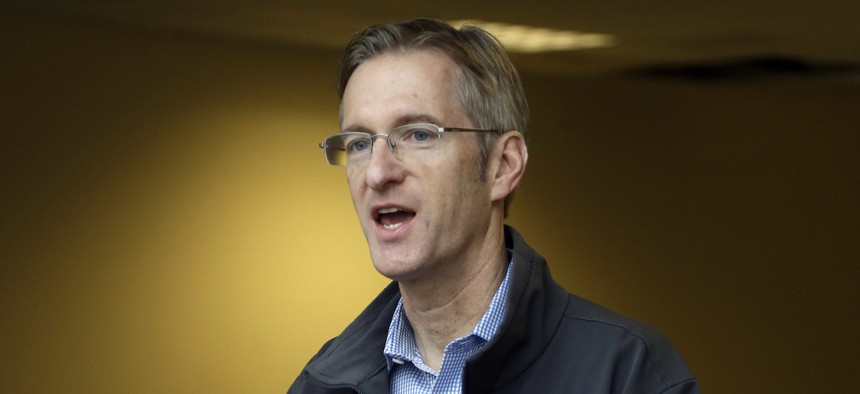Portland’s Ted Wheeler: ‘The Role of Mayor Has Never Been So Important As It Is Right Now’

Portland, Oregon, Mayor Ted Wheeler Don Ryan / AP File Photo
The new city hall leader exemplifies the passion and dynamism that is stirring in cities and mayors across the nation.
Before Ted Wheeler had logged six months as mayor of Portland, Oregon, his city experienced a tragedy that made national headlines: Two men were stabbed to death and another was injured when they tried to stop a man’s anti-Muslim hate speech tirade against two young women on a MAX light-rail train. At a time when this sort of violence, racial strife and political tension are causing exhaustion, frustration and malaise in state houses and federal institutions, you hear something quite the opposite from Wheeler.
Wheeler said that the incident has brought Portland closer together.
“Here in Portland people are demanding something other than a very far right or very far left view of the world,” Wheeler explained. “People who are maybe not typically as engaged in policy or politics are now stepping into the dialogue and demanding to be heard, and so I see this as an opportunity for our community to come together, have frank discussions about race and immigration.”
Wheeler, sees his role as mayor as not only a convener, but to use his “leadership capacity and the bully pulpit” to help lead what he calls “the hard conversations” around race, ethnicity, and immigration—a conversation he says is “way past due.”
It’s clear he believes he is in the right position at the right time.
“Right now, my view is that all meaningful policy innovation is taking place at the municipal level,” Wheeler told Route Fifty in an interview this week. “This is where the game is. I couldn’t be happier to be a mayor at this time in U.S. history.”
What may be most striking from the interview, though, is that the incident is just one focal point of Wheeler’s resolve. Issues specific to this incident are not where the conversation with Wheeler ends, but where it begins. It’s a piece of the larger conversation about the future of Portland, our cities, and the nation.
Over the course of our conversation, the mayor elaborated on a number of key issues that he planned to tackle despite “disinvestment by both the federal and state governments,” from climate change, to homelessness and housing affordability, to emergency management and public safety strategies.
“I don’t think the best and highest use of my position as mayor is to sit around and complain about the state of affairs,” Wheeler remarked. “I think it is my job to lead and use the resources we have available and the community partners that we have engaged in this community to move forward on our own policy initiatives, and in many respects I think we can do better work at the local level than we would be able to do if we relied more heavily on state and federal resources.”
This sentiment isn’t borne out of inexperience or unfamiliarity. Wheeler has over a decade of experience in elected office, previously serving as Oregon’s state treasurer and chairman of the Board of Commissioners in Multnomah County, of which Portland is the county seat. The Oregonian referred to him as “one of Oregon's most accomplished politicians” after he ran away with the election last year, avoiding a runoff election by capturing over 50 percent of the vote in a field of 15 candidates.
Wheeler made clear he feels as mayor has more opportunities to effect change for those he serves than ever before. As he arrives in Miami for the U.S. Conference of Mayors annual conference this weekend, Wheeler said he is hoping to identify strategies and policies that he can put to work back in Portland.
However, Wheeler has a broader philosophy on why it’s important for him and his fellow mayors to convene.
“My view is that 80 percent of the U.S. population lives in cities and it’s unfortunate, but we’re being forgotten by the national conversation; the real America is in our cities,” Wheeler said. “This is an opportunity for me to meet with colleagues who don’t have a chamber like Congress to do our business and share our ideas.”
Mitch Herckis is senior director of programs for Government Executive’s Route Fifty and is based in Washington, D.C.
NEXT STORY: What to Watch For as U.S. Mayors Meet in Miami Beach






